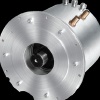Индустриален клъстер "Електромобили" - Учредители:








 |

|

|
| Актуално | За клъстера | Екип | Членове | Документи | Анализи | Услуги | Стани член | Награди | ССЕМ | Контакти |
ИКЕМ - Индустриален клъстер "Електромобили" | Петък, 02.01.2026 | |
|
Electric Vehicle Technology, Sales. Taxation and State Laws. Synthesis
The combination of high oil costs, concerns about oil security and availability, and air quality issues related to vehicle emissions are driving interest in ―plug-in‖ hybrid electric vehicles (PHEVs). PHEVs are similar to conventional hybrid electric vehicles, but feature a larger battery and plug-in charger that allows electricity from the grid to replace a portion of the petroleum-fueled drive energy. PHEVs may derive a substantial fraction of their miles from grid-derived electricity, but without the range restrictions of pure battery electric vehicles. As of early 2007, production of PHEVs is essentially limited to demonstration vehicles and prototypes. However, the technology has received considerable attention from the media, national security interests, environmental organizations, and the electric power industry. In 2006, the Bush administration announced the U.S. Advanced Energy Initiative, which includes the goal of developing a PHEV capable of traveling up to 40 miles on a single electric charge. For many U.S. drivers, a PHEV-40 could reduce average gasoline consumption by 50% or more. The economic incentive for drivers to use electricity as fuel is the comparatively low cost of fuel. Given the potential cost advantages, a study by the Electric Power Research Institute (EPRI) found a significant potential market for PHEVs, depending on vehicle cost and the future cost of petroleum. Furthermore, several researchers have noted that by adding ―vehicle-to-grid‖ (V2G) capability, where the vehicle can discharge as well as charge, PHEV owners may also receive substantial revenue by using the stored energy in their vehicles to provide high-value electric system services such as regulation, spinning reserve, and peaking capacity. The use of PHEVs would represent a significant potential shift in the use of electricity and the operation of electric power systems. Electrification of the transportation sector could increase generation capacity and transmission and distribution (T&D) requirements, especially if vehicles are charged during periods of high demand. Other concerns include emissions impacts including regulated emissions and currently unregulated greenhouse gas emissions. Utilities are interested in the net costs associated with this potential new load, including possible benefits of improved system utilization enabled by controlled PHEV charging. This study is designed to evaluate several of the PHEV-charging impacts on utility system operations within the Xcel Energy Colorado service territory. The authors performed a series of simulations in which the expected electricity demand of a fleet of PHEVs was added to projected utility loads under a variety of charging scenarios. The simulations provide some basic insight into the potential grid impacts of PHEVs, focusing on the following issues: • How do various PHEV-charging scenarios affect the total system load? • What are the emissions associated with PHEV charging, and what are the combined emissions from both generator and vehicle? How do these emissions compare to a conventional vehicle? • What are the marginal costs associated with PHEV charging? • What are the quantifiable system benefits associated with controlled PHEV charging? |
Продукти 
Комплектна система за задвижване на електромобилиСистемата за електрозадвижване обхваща гама с три основни типоразмера на ел. мощност със съответните компоненти - електромотор и контролер. oще ...Виж всички продуктиАнкета с продължение...
|
|
|
 ЕВРОПЕЙСКИ СЪЮЗ Европейски фонд за регионално развитие Инвестираме във вашето бъдеще |
 |
 ОПЕРАТИВНА ПРОГРАМА „Развитие на конкурентоспособността на българската икономика” 2007-2013 www.opcompetitiveness.bg |
|
Интернет страницата е създадена с финансовата подкрепа на ЕФРР, в рамките на проект „Развитие на Индустриален Клъстер Електромобили” по ДБФП К-02-2/28.09.2011 г. |
|||